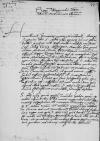Accepi superiori die Serenissimae Maiestatis Vestrae gratiae in me plenas ⌊⌋, quibus mihi post mortem ⌊Valdesii⌋ mei statum ⌊caesareae maiestatis⌋ curiae descripsit. Accidit hoc, quod rebar futurum, dominum commendatorem maiorem ⌊Covos⌋ officia ⌊regni Neapolitani⌋ ad se recepturum, ipse etiam ⌊marchionem de Villafranca⌋ fecit viceregem. Non frustra igitur consului, quod Serenissima Maiestas Vestra, modis quibus posset, amicitiam ⌊illius⌋ ambiret, cum ⌊caesar⌋ nihil ei non tribuat et credat. De domino ⌊Cornelio⌋ metuebam id, quod evenit, nullum scilicet officium post ⌊Valdesium⌋ illi successurum et hoc paper damaged⌈[hoc]hoc paper damaged⌉ propter dominum ⌊Covos⌋, qui suis ⌊Hispanis⌋ plus aeque affectus est, affectus etiam non male tum, cum apud illos agerem, rebus Serenissimae Maiestatis Vestrae, quibus ut omnia felicissime evenirent, summopere desidero. Serenissimae Maiestati Vestrae, quas possum, immortales habeo gratias, quod adeo clementer litteris meis responderi iubet semper mecumque expostulat de incuria nuntiorum meorum, quod Serenissimam Maiestatem Vestram non reddunt certiorem, quando absoluti a curia ad me revertuntur. Et hoc superinscribed⌈hochoc superinscribed⌉ non nisi ex singulari erga me gratia Serenissimae Maiestatis Vestrae, quam tantam meruisse mihi non videor, procedit. Utinam illam et mereri et auctiorem mihi in dies facere possim, conatus quidem ad id mei numquam mihi deerunt.
 BNW, BOZ, 2053, TG 15, No. 1733, f. 72v Habeo item, quas tenuitas mea potest, Serenissimae Maiestati Vestrae gratias immensas pro ea ad fortunas meas Serenissimae Maiestatis Vestrae propensione, qua effecit, ut ad ⌊urbem⌋ contra ⌊adversarium⌋ meum a ⌊serenissima maiestate regia⌋ scriberetur. Paulo ante ⌊reverendissimus dominus Varmiensis⌋ mihi significavit se contra ⌊eundem⌋ a ⌊serenissima maiestate regia⌋ accepisse litteras, illum vero privilegio ⌊pontificis⌋ se ex iurisdictione eius traxisse et quod ob id nihil contra illum statuere posset. Nescio, quid non Romana haec curia faciat aut praesumat, Deus aliquando nostri misertus viderit.
BNW, BOZ, 2053, TG 15, No. 1733, f. 72v Habeo item, quas tenuitas mea potest, Serenissimae Maiestati Vestrae gratias immensas pro ea ad fortunas meas Serenissimae Maiestatis Vestrae propensione, qua effecit, ut ad ⌊urbem⌋ contra ⌊adversarium⌋ meum a ⌊serenissima maiestate regia⌋ scriberetur. Paulo ante ⌊reverendissimus dominus Varmiensis⌋ mihi significavit se contra ⌊eundem⌋ a ⌊serenissima maiestate regia⌋ accepisse litteras, illum vero privilegio ⌊pontificis⌋ se ex iurisdictione eius traxisse et quod ob id nihil contra illum statuere posset. Nescio, quid non Romana haec curia faciat aut praesumat, Deus aliquando nostri misertus viderit.
Non vulgariter mihi gratum fuit, quod soleae illae Serenissimae Maiestati Vestrae placuerint. Utinam aliquid mihi esset istiusmodi, quo sedulo gratiam Serenissimae Maiestatis Vestrae promereri possem. Cui me humillime commendo. ⌊Christus⌋, Dominus noster in longaeva prospera valetudine et omnium felicissimorum success<u>um augmento eandem Serenissimam Maiestatem Vestram quam diutissime conservet.
 BNW, BOZ, 2053, TG 15, No. 1733, f. 73r
BNW, BOZ, 2053, TG 15, No. 1733, f. 73r
 BNW, BOZ, 2053, TG 15, No. 1733, f. 72r
BNW, BOZ, 2053, TG 15, No. 1733, f. 72r
 BNW, BOZ, 2053, TG 15, No. 1733, f. 72v Habeo item, quas tenuitas mea potest, Serenissimae Maiestati Vestrae gratias immensas pro ea ad fortunas meas Serenissimae Maiestatis Vestrae propensione, qua effecit, ut ad
BNW, BOZ, 2053, TG 15, No. 1733, f. 72v Habeo item, quas tenuitas mea potest, Serenissimae Maiestati Vestrae gratias immensas pro ea ad fortunas meas Serenissimae Maiestatis Vestrae propensione, qua effecit, ut ad 

